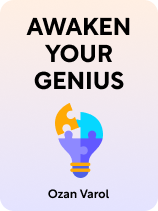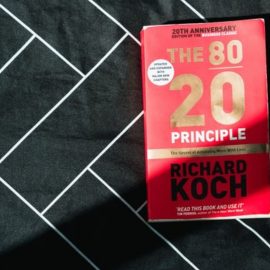

This article is an excerpt from the Shortform book guide to "Awaken Your Genius" by Ozan Varol. Shortform has the world's best summaries and analyses of books you should be reading.
Like this article? Sign up for a free trial here.
What do you want out of life? How can you align your desires with your authentic self?
Discovering what you want out of life is a journey of self-exploration and experimentation. Ozan Varol’s book Awaken Your Genius includes insights on defining personal success and pursuing unconventional paths. Also, career coach Paul Millerd provides a real-world example of this sort of approach to success.
Continue reading to learn how you can uncover your unique definition of success and create a life that resonates with your true self.
What Do You Want Out of Life?
So, what do you want out of life? In his book, Varol provides a couple of prompts to help you figure out what makes you special: Remember your child self, and understand what’s distinct about you now. He says you can use that information to discover what you truly want out of life and then shape your life’s direction.
Varol recommends making sure that your desires are aligned with what you know about your true self instead of aiming to achieve what others tell you is worthwhile. Most life advice is based on generalized assumptions about success and happiness—for example, your parents might advise you to pursue a business degree instead of an art degree because they value financial security. But, if your true self is an artist, taking their advice might stop you from fulfilling your creative potential.
For this reason, Varol recommends taking an avant-garde approach to success. This approach involves:
- Coming up with your own definition of success. As you zero in on what fulfills you, you might find that it doesn’t align with traditional markers of success. Varol says that’s OK—these markers are arbitrary, and you don’t need others’ approval to be successful.
- Seeing life as an endless experiment. Varol says the best way to determine what’s truly important to you is by experimenting with different career paths and other activities. It’s OK to repeatedly change course—always prioritize what matters to you right now.
- Defining a clear end goal. If you don’t, you won’t be able to recognize when you’ve achieved success. You’ll never feel fulfilled, and you’ll fall into the trap of always seeking more.
- Going off the beaten path. Varol says that, in some cases, taking traditional paths forward won’t help you pursue your desires. Say you’re interested in an unconventional career, such as ASMR artistry (a popular YouTube-based career). You may have to invent your own career path, since you can’t take traditional career steps like majoring in ASMR or interning at ASMR firms.
| Paul Millerd’s Avant-Garde Approach to Success In The Pathless Path, career coach Paul Millerd explains how he figured out what he wanted out of life and created conditions that allowed him to pursue it. When Millerd began his career, he assumed a traditional career path was right for him because that’s what others defined as worthwhile. He achieved some success on this route, but he learned that it wouldn’t make him happy. A series of personal crises prompted him to re-evaluate his priorities, shifting his focus away from traditional work and toward recreation, exploration, and joy. As a result, he left his job and pursued a freelance career instead, which enabled him to pursue work aligned with his creative passions and gave him the freedom to explore life (and the world) more fully. Does this way of life sound appealing to you? If so, here’s what Millerd has to say about each of Varol’s recommendations. Varol recommends coming up with your own definition of success. Millerd argues that you should measure success in terms of contributing something important to the world and living according to your values. He says this definition of success will naturally bring joy to your daily life, while adhering to traditional definitions of success is likely to leave you feeling unfulfilled. Varol recommends seeing life as an endless experiment. Millerd sees life similarly and explains that he incorporates experimentation into his daily life. Most people don’t have enough spare time to explore a variety of interests as part of daily life, but as a freelancer, Millerd is able to make time. He experiments by devoting intense energy to a new experience (like learning a new language or traveling) for a short period of time before resting and moving on to another experience. This allows him to gradually figure out what makes him happy. Varol recommends defining a clear end goal so that you aren’t always seeking more. Millerd takes a more flexible approach to getting what you want out of life—he warns against “arrival fallacies” that suggest you’ll be happy once and for all upon arriving at a given goal. But he provides an alternative strategy for avoiding the “never-satisfied” trap: Pursue sustainability over endless wealth, and learn to be happy with what you have. Finally, Varol recommends going off the beaten path if conventional methods won’t help you pursue your desires. Similarly, Millerd explains that freelancing allows you to create your own career path when established paths don’t exist. He also explains that you can take a mixed approach: If you’re worried about financial security, you can transition to freelancing gradually by keeping a regular job while you pursue your dream career on the side. Once your side hustle becomes lucrative, you can quit your regular job and commit to freelancing. |
Exercise
- Imagine your ideal day, free from any social obligations or pressures. What activities would you include?
- How does your vision of an ideal day align with your current lifestyle and choices? If they’re not aligned, how could you get closer to achieving that vision?

———End of Preview———
Like what you just read? Read the rest of the world's best book summary and analysis of Ozan Varol's "Awaken Your Genius" at Shortform.
Here's what you'll find in our full Awaken Your Genius summary:
- The reasons why you’ve abandoned your true self so far in life
- A former rocket scientist’s tips for embodying your true self
- How to achieve creative fulfillment and personal growth






